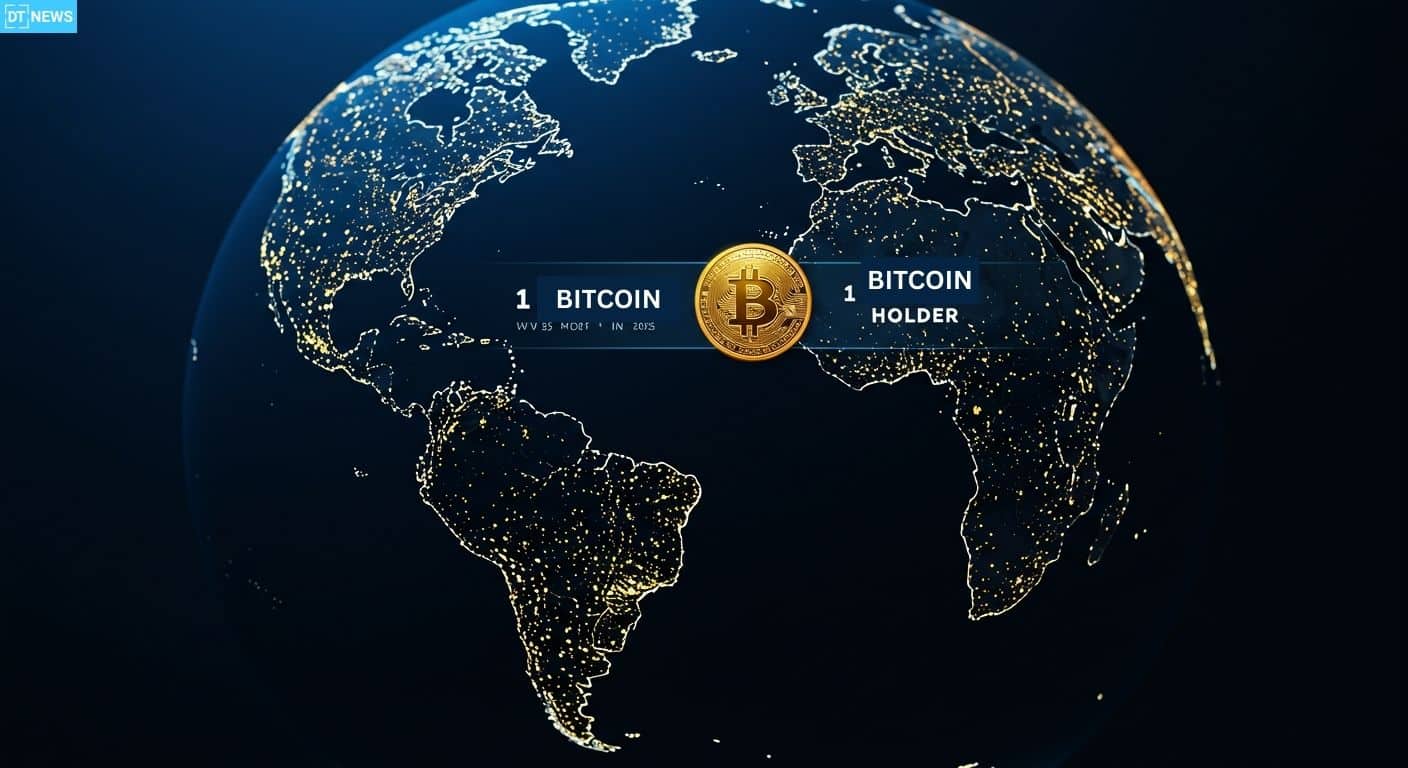Owning 1 Bitcoin has become a coveted achievement. As of mid-2025; blockchain data shows only 827,000-900,000 addresses have at least 1 BTC. Accounting for exchanges and multi‑wallet accounts, that is roughly 800,000-850,000 people worldwide, according to sources. Out of 8.2 billion people on Earth, that is 0.01%-0.02% of the population .
- Bitcoin’s Fixed Supply and Uneven Wealth Distribution
- Global Ownership: Who Owns Cryptocurrency (and 1 BTC)?
- Is Owning 1 Bitcoin in 2025 Enough to Make You Rich?
- Wealth Concentration and Market Dynamics
- Accumulating 1 Bitcoin: Strategies and Considerations
- Conclusion
- Glossary
- FAQs for Why Owning 1 Bitcoin in 2025 Is Rare
In other words, less than 2 in 10,000 people have a whole Bitcoin. Owning 1 Bitcoin in 2025 therefore seems like belonging to an ultra exclusive club.
In reality, most wallets have far less than 1 coin. On-chain charts show 92% of all Bitcoin addresses have under 0.1 BTC, and only about 1.6% of addresses have 1 BTC or more. This shows full-Bitcoin balances are super rare. By contrast, 6.8% of people (560 million) worldwide own any cryptocurrency.
Bitcoin’s Fixed Supply and Uneven Wealth Distribution
Bitcoin has a 21 million coin cap. As of this year, reports claim about 19.8 million BTC have been mined, leaving only 1.2 million unmined. Even among those in circulation, a big chunk is effectively out of reach. 29% of mined Bitcoin (7.7M BTC) is believed to be permanently lost (unspent for 5+ years).
Compounding this scarcity is extreme concentration of ownership. On-chain analysis shows 1.86% of addresses control 90% of all $BTC. A few “whale” wallets mainly exchanges, early adopters and institutions, hold huge amounts. For example, 4 addresses own 14% of Bitcoin supply, and the top 100 addresses hold 58%.
In other words, while millions own fractions of Bitcoin, most whole coins are in very few hands. Notably, Bitcoin’s creator Satoshi Nakamoto alone is estimated to hold 750,000-1.1 million BTC (worth $92-135 billion at mid-2025 prices).
This uneven distribution means every 1 BTC “retail” holder owns a particular fraction of the remaining non-whale supply.
Also read: European Tech Unveils Bitcoin Accumulation, Plans 100,000 BTC by 2030

Global Ownership: Who Owns Cryptocurrency (and 1 BTC)?
Based on available data, about 6.8% of people globally (560 million adults) now own some form of cryptocurrency. But among those, having a full Bitcoin is still rare. According to industry data, only 0.18% of all crypto owners have 1 BTC or more.
In 2025, estimates suggest 982,747 wallet addresses had 1 BTC or more. Considering exchange custody and multiple-wallet users, analysts estimate about 800,000 people truly own 1 Bitcoin.
| Population Segment | Approximate Count | Percent of Group |
| World population (2025) | 8,200,000,000 | – |
| Any cryptocurrency owners (6.8%) | 560,000,000 | 6.8% of world pop. |
| Wallets with 1 BTC | 983,000 | 0.012% of world pop. |
| Unique people with 1 BTC | 800,000 (est.) | 0.01% of world pop. |
| Millionaires worldwide | 58,000,000 | 0.7% of world pop. |
These numbers show that owning 1 Bitcoin in 2025 is rarer than being a millionaire. There are 58 million millionaires today according to sources, but less than 1 million people have 1 Bitcoin. Hence, one could say the bar for “1 BTC membership” is very high.
Barriers to ownership go beyond wealth. An estimated 1.4 billion adults are unbanked globally, based on reports. Many of those don’t have reliable internet, government IDs or crypto access. In emerging markets (Sub-Saharan Africa, South Asia), high KYC requirements and fees make it hard to buy crypto.
Although mobile money apps are widespread in some regions, rigid regulations and tax uncertainty make it hard for the unbanked to buy Bitcoin.
Is Owning 1 Bitcoin in 2025 Enough to Make You Rich?
1 Bitcoin is roughly ranged around $110k-$120k. That is a life changing amount for many, but not enough to get into the “billionaire” club. Still, 1 BTC is a lot of money, more than the average person can invest at once. Allocating $120k to a volatile asset requires high income and strong conviction. Few can risk that much of their savings without stretching their finances.
Compared to traditional stocks or bonds, Bitcoin’s volatility is unpredictable. Many retail investors fear such swings as not everyone can stomach a loss. As a result, many would-be buyers hesitate or only invest tiny fractions.
Moreover, Bitcoin has a stigma of speculation for some. High profile critics call it a bubble or worse. Nobel laureate Robert Shiller called it “the best example of a speculative mania”, Warren Buffett famously said Bitcoin is “probably rat poison squared” and George Soros warned of a classic bubble. These warnings and real cases of market manipulation contribute to skepticism.
Wealth Concentration and Market Dynamics
Blockchain analysts say ownership has gradually moved away from early whales. According to researchers at Glassnode, Bitcoin’s wealth is not as concentrated as people think. In their analysis, small holders (0-50 BTC) now own a growing share, while the richest addresses’ share has decreased slightly since 2017.
Glassnode says only about 2% of entities own 71.5% of BTC, not the 95% often claimed. In short; retailers do own a part of the pie, even if whales still own most of it.
However, Glassnode also sees a recent uptick in whale accumulation . Over the last year, big entities (hedge funds, custodians) have added to their holdings, so the whales have more of the supply. This is the same as institutional investors; from asset managers to corporations, getting into Bitcoin.
Companies like Strategy (MicroStrategy) now hold hundreds of thousands of $BTC. As institutions buy big blocks, fewer coins are left for new retail buyers.
Financial strategists note this can make “full-coin” ownership even harder. When big players buy up supply, smaller investors are left fighting over a smaller pool. In practice, this has led some long-time holders to sell parts of their stack at current prices.
Some even point out that the number of addresses holding 1 BTC briefly dropped after ETFs and corporate buys, so smaller holders have been net sellers recently.
Accumulating 1 Bitcoin: Strategies and Considerations
Despite the challenges, there are clear ways to get to 1 Bitcoin. Here are common paths:
Invest a fixed amount of fiat into Bitcoin at regular intervals. This spreads out risk over time, smooths out volatility. Even small monthly purchases can add up to 1 BTC over time. Many financial advisors recommend DCA to avoid timing the market.
Some platforms offer interest on crypto deposits or lending yields (often high risk). Savvy investors use these to accelerate accumulation, but should be aware of counterparty and security risks.
Wealthy individuals or companies can divert a portion of large incomes (or corporate treasuries) to buy Bitcoin. Strategy’s CEO Michael Saylor, for example, applied cash reserves to Bitcoin, making Strategy a top $BTC holder.
For high earners, just allocating part of a bonus or salary can get investors a to 1 BTC faster.

Since 2024, U.S. spot Bitcoin ETFs (e.g. BlackRock’s IBIT, Fidelity’s FBTC) allow investors to buy $BTC through a brokerage account. Over $120 billion has flowed into these ETFs, so mainstream investors have a regulated, liquid way to get Bitcoin exposure. ETFs can be more straightforward with no wallet hassle;, but small management fees apply.
Web3 companies sometimes pay salaries in stablecoins (like USDT). Investors could convert part of each paycheck into $BTC. Receiving payments in crypto or stablecoin reduces traditional banking friction and can be a stealth way to accumulate Bitcoin.
No strategy however is risk free. Bitcoin is volatile so investors need to be prepared for big swings. Investors are advised to always consider risk tolerance before any investment.
Also read: Institutional Accumulation Rises as Corporates Control 3.1% of BTC
Conclusion
Based on the latest research, owning 1 Bitcoin in 2025 is exclusive. Only 0.01–0.02% of the world’s population have a full coin. Bitcoin’s capped supply, lost coins and whale accumulation means those coins are a shrinking, highly sought after resource.
Smaller holders have made progress over time, but institutions and long term wallets still control the ledger. In reality, getting to 1 Bitcoin requires long term planning; steady DCA investing, high savings rate or corporate scale allocations.
In short, 1 BTC might be enough; but few will ever get there.
For in-depth analysis and the latest trends in the crypto space, our team offers expert content regularly.
Disclaimer: This article is for informational purposes only and not financial advice. Bitcoin prices are volatile and investing is risky; Always do your own research or consult a financial advisor.
Summary
Owning 1 Bitcoin In 2025, is super rare as less than 850,000 people worldwide have achieved it. The coin’s hard 21M cap, lost supply and concentrated ownership means most people can’t get to 1 BTC. Current data and expert analysis shows 1 BTC puts holders in an elite group.
Glossary
Bitcoin: The first decentralized cryptocurrency; created in 2009.
Blockchain Address (Wallet): A unique identifier for sending/receiving $BTC on the blockchain.
Whale: A term for individuals or entities holding large amounts of $BTC.
Dollar-Cost Averaging (DCA): Investment strategy of buying a fixed dollar amount of an asset (like Bitcoin) at regular intervals; regardless of price, to reduce the impact of volatility.
Know Your Customer (KYC): Regulatory requirement for exchanges to verify identity.
FAQs for Why Owning 1 Bitcoin in 2025 Is Rare
How many people own at least 1 Bitcoin?
Blockchain data shows around 983,000 wallet addresses hold 1 BTC or more as of mid-2025. Accounting for institutions and split wallets; analysts estimate; 800,000-850,000 unique people own one Bitcoin or more.
What percentage of the world’s population owns 1 BTC?
About 0.01-0.02% of the global population, i.e. only a few out of every 10,000 people. By contrast; 6.8% of people own some cryptocurrency.
Is 1 Bitcoin enough to be rich?
1 Bitcoin assuming it is pegged at $120,000 in 2025 is a lot but not millionaire status. However; owning 1 BTC puts one in a crypto elite club and could yield big gains if $BTC goes up.
Who are the big Bitcoin holders (whales)?
A small percentage of addresses hold most of the Bitcoin. The largest known holders are exchanges (e.g. Binance’s cold wallets) and corporate treasuries. Strategy (MicroStrategy) holds above 628,000 BTC. Glassnode analysis shows 2% of entities control 72% of all BTC. Bitcoin’s pseudonymous creator “Satoshi” is estimated to own 1.1 million BTC.
How to save up 1 BTC?
Common ways include dollar-cost averaging (buying regularly over time); using Bitcoin ETFs in brokerage accounts, investing part of savings or income in crypto, or even earning crypto through Web3 jobs. Each method requires discipline: for example, a fixed monthly purchase over years can accumulate 1 BTC without risking a single large lump sum.



















































































































